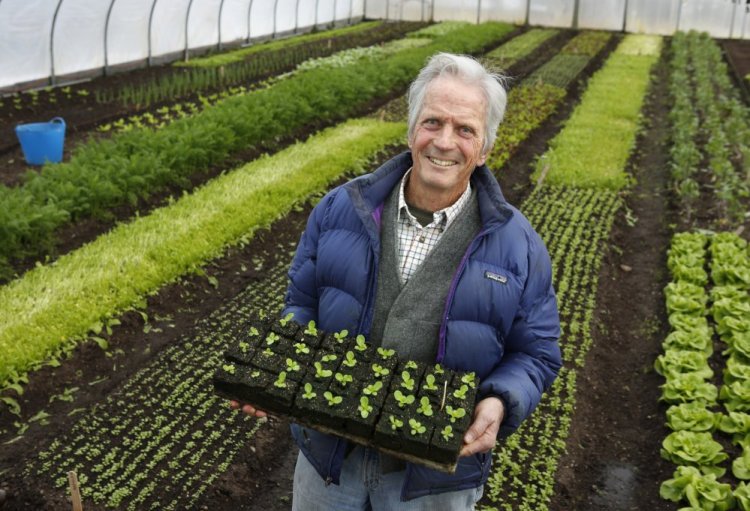EDITOR’S NOTE: In the three dozen letters that make up “Letters to a Young Farmer,” some of the most lauded advocates for sustainable living and eating offer advice to the next generation. The book, organized by the Stone Barns Center for Food and Agriculture, a nonprofit in New York that trains farmers, includes words of wisdom from Alice Waters, Michael Pollan, Wendell Berry, Barbara Kingsolver, Joel Salatin, Bill McKibben and more.
Some talk of history, of farms lost to development and the cost of those losses to the local community. Some write with gratitude about the hope they see in the many young people eager for a farm life. In her letter, U.S. Rep. Chellie Pingree, a Democrat representing Maine’s 1st District and a longtime organic farmer, notes the growth of family farming in Maine after a long period of decline – a return, she said, that is “part of the idea of farming as a political act.”
Eliot Coleman, who has been farming in Maine for nearly half a century, writes of practical matters, of harvest dates, seed storage and potlucks. His letter is reprinted here with permission from publisher Princeton Architectural Press.
By Eliot Coleman
Attention to detail. It really is that simple. Those three words are good advice for all businesses, but attention to detail is probably more important on the small, diversified farm than anywhere else. That’s because of the incredible number of factors that come into play when you are working with the natural world and especially when growing a wide variety of crops and livestock, to boot.

For a quick idea of the level of attention needed, consider the numbers involved. Some small vegetable farms may grow thirty-five or more different crops. And to spread out the offerings, they may sow four or five cultivars of some of them. Successional harvests require numerous planting dates. Those dates are determined by keeping careful notes during previous years. In total, that amounts to hundreds of varied and possibly unique decisions about crop rotations, soil types, specific planting and harvest dates, labor requirements, storage and handling, and other factors. I have always felt that anyone running a successful small, diversified farm could move right in to the CEO chair of a medium-scale business and not miss a step.
So let’s start at the beginning of your year. Did you order the seeds on time and in sufficient quantity? Did you find a substitute for that favorite eggplant that was back-ordered? How much should you plant of that new, untried tomato variety? Do you have flats and marker stakes? Are the seeds stored properly? Is there sufficient potting soil on hand? Have you tested the new batch with a few trial seeds to be sure it is mixed correctly? Has the greenhouse heater been serviced? When was the greenhouse plastic last replaced? Have you checked to see that the bottom heat controls keep the flats at the ideal temperature for germination? Do you have an accurate thermometer for that task? Do you have an alarm set up in case the power goes out or the heater malfunctions? And those are just a few of the considerations on day one.

Eliot Coleman says attention to detail is probably more important on the small, diversified farm than anywhere else.
If you are producing crops and livestock products, you need to be set up to sell them. I guarantee there will be marketing surprises every year for the unwary. Are any of your stores and restaurants expanding or have some gone out of business? Are there crops they want that you are not growing yet? Does the new produce manager at the co-op realize that you have traditionally supplied all their winter squash? Will you have enough delivery crates for that new account you just added?
Every fall by tradition at a neighborhood farmers’ potluck, one of us will read aloud E. B. White’s delightful essay “Memorandum.” I recommend it. In paragraph after paragraph, White’s list begins with, “Today I should,” “I ought to finish,” “First, though, I would have to,” “I ought to get some,” or “It just occurred to me,” and ends with, “I see it is four o’clock already and almost dark, so I had better get going.” We all laugh and clink glasses, reminded that the life we have chosen is complicated and multifunctional, with more features than most people can imagine.
But there is no joy in doing anything poorly. We get our satisfaction out of doing it well. That means keeping our eyes open, writing down observations, never taking anything for granted, and acknowledging the veracity of the old Chinese saying that “the best fertilizer for any farm is the footsteps of the farmer.”
Eliot Coleman is a farmer and author of many books, including “The New Organic Grower,” “Four-Season Harvest,” and “The Winter Harvest Handbook.” His market garden in Harborside, Maine, sells fresh vegetables grown in unheated greenhouses all winter.
Send questions/comments to the editors.



Comments are no longer available on this story